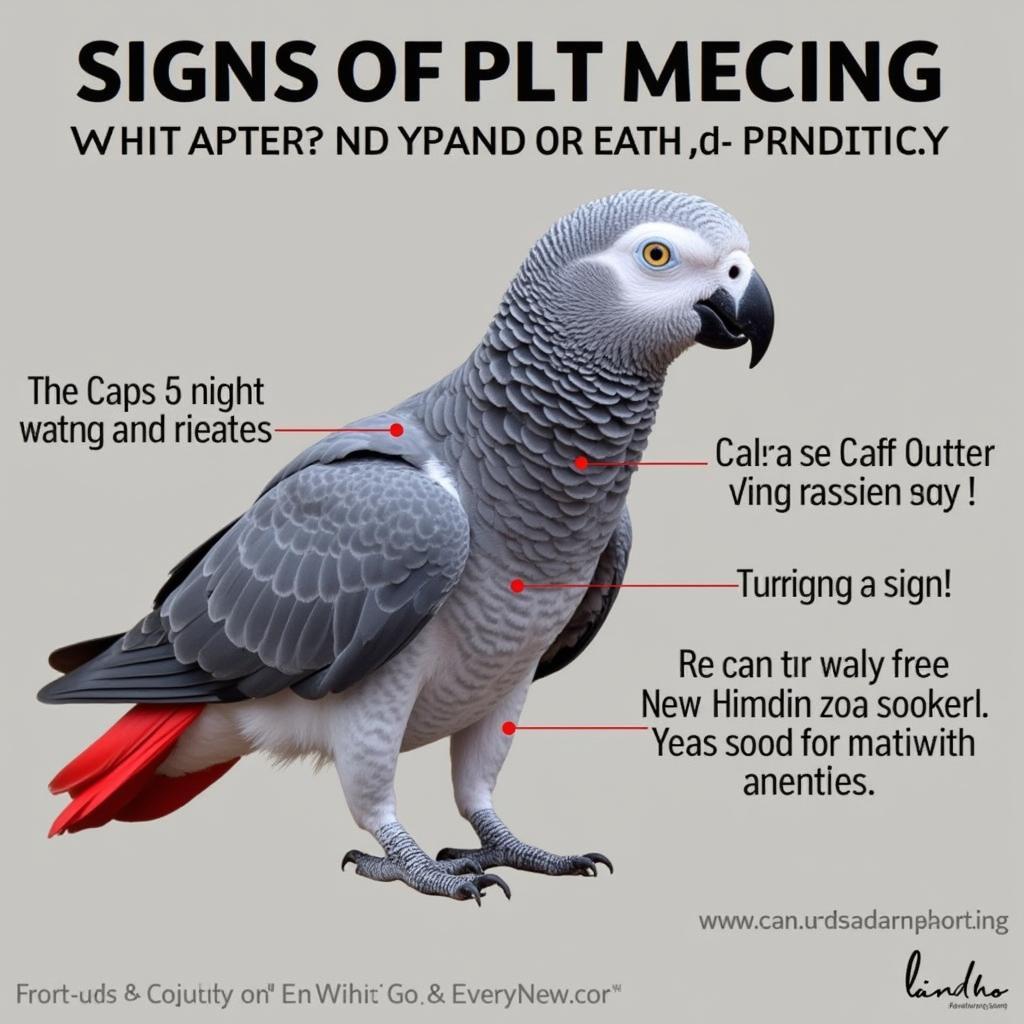African Grey Parrot Common Health Problems
African Grey Parrot Common Health Problems can range from minor issues to serious, life-threatening conditions. Understanding these potential health concerns is crucial for any African grey owner to ensure their feathered companion lives a long, healthy, and happy life. Early detection and prompt veterinary care are essential for successful treatment.
Understanding Your African Grey’s Health Needs
Owning an African Grey parrot is a significant responsibility. These intelligent and sensitive birds require specialized care, including a balanced diet, enriching environment, and regular veterinary check-ups. Ignoring their specific needs can lead to various health problems.
African Greys are prone to certain health issues, some of which are related to their sensitive nature and complex dietary needs. For instance, they are susceptible to feather plucking, often a sign of stress, boredom, or underlying medical conditions. A poor diet lacking in essential vitamins and minerals can lead to nutritional deficiencies, affecting their overall health and well-being.
Common Health Issues in African Grey Parrots
Several health problems frequently affect African Grey parrots. These range from behavioral issues like feather destructive behavior, which can be triggered by stress as seen in some cases of african grey parrot behaviour problem, to more serious medical conditions like Proventricular Dilatation Disease (PDD), a viral infection affecting the digestive system.
Nutritional Deficiencies
- Vitamin A Deficiency: This deficiency can lead to respiratory infections, poor feather quality, and weakened immune system.
- Calcium Deficiency: Low calcium levels can result in seizures, weakened bones, and egg-binding in females. Ensuring they get the correct african love birds food is key.
- Hypocalcemia: A serious condition caused by low blood calcium, resulting in muscle weakness, tremors, and seizures.
Infectious Diseases
- Psittacine Beak and Feather Disease (PBFD): A highly contagious viral disease that can cause feather loss, beak deformities, and immunosuppression.
- Avian Bornavirus (ABV) or PDD: A viral infection affecting the nervous system and gastrointestinal tract, causing regurgitation, weight loss, and neurological symptoms.
- Bacterial Infections: Various bacterial infections can affect the respiratory system, digestive tract, and other organs.
Behavioral Problems
- Feather Plucking: A common issue often related to stress, boredom, or underlying medical conditions. Sometimes, behavioral issues can be observed as unusual physical signs, such as african grey shaking head.
- Screaming: Excessive screaming can be a sign of boredom, anxiety, or a learned behavior. Understanding african grey behavior can help owners address these issues.
 African Grey Parrot Exhibiting Feather Plucking Behavior
African Grey Parrot Exhibiting Feather Plucking Behavior
Other Health Concerns
- Atherosclerosis: A buildup of plaque in the arteries, leading to heart disease.
- Lipomas: Fatty tumors that can develop under the skin.
- Heavy Metal Toxicity: Exposure to heavy metals like zinc or lead can cause serious health problems.
Dr. Avian Care, a renowned avian veterinarian, emphasizes the importance of a balanced diet: “Providing a nutritionally complete diet is fundamental for preventing many common health problems in African Greys. A diet rich in fresh fruits, vegetables, high-quality pellets, and occasional healthy nuts and seeds is crucial.”
Preventing Health Problems in African Greys
Proactive measures can significantly reduce the risk of health problems in your African Grey.
- Balanced Diet: Provide a varied and nutritious diet.
- Enrichment: Offer plenty of toys and opportunities for social interaction.
- Hygiene: Maintain a clean cage and fresh water.
- Regular Veterinary Check-ups: Schedule regular check-ups for early disease detection.
Conclusion
African grey parrot common health problems require vigilant observation and proactive care. By understanding their specific needs and potential health risks, owners can ensure their beloved companions enjoy a long, healthy life. Regular veterinary checkups and a commitment to providing a stimulating environment and a balanced diet are vital for preventing and managing these health concerns. Remember, early detection and intervention are key to successful treatment.
FAQ
- What are the signs of a sick African Grey parrot? Changes in behavior, appetite, droppings, or feather condition can all be indicators of illness.
- How often should I take my African Grey to the vet? Annual check-ups are recommended, even if your bird appears healthy.
- What is the best diet for an African Grey parrot? A balanced diet consisting of high-quality pellets, fresh fruits, vegetables, and a small amount of healthy nuts and seeds.
- How can I prevent feather plucking in my African Grey? Provide a stimulating environment, plenty of toys, and address any underlying medical or stress-related issues.
- What should I do if my African Grey is showing signs of illness? Contact an avian veterinarian immediately.
- How much does an african gray parrot price in mumbai? Prices can vary depending on factors like age and breeder.
- Can African Greys be prone to respiratory problems? Yes, they can be susceptible to respiratory infections, particularly if exposed to drafts or poor air quality.
Scenarios of Common Questions:
- Scenario 1: Your African Grey is suddenly losing weight and regurgitating food. This could be a sign of PDD, and you should consult a vet immediately.
- Scenario 2: Your parrot is plucking its feathers. Observe its environment for stressors and consider consulting a vet to rule out any underlying medical conditions.
- Scenario 3: Your African Grey is lethargic and not eating. This could indicate a variety of health issues, and a vet visit is crucial.
Further Reading and Related Topics:
- African Grey Parrot Diet and Nutrition
- Creating an Enriching Environment for Your African Grey
- Understanding African Grey Parrot Behavior
When you need help, please contact Phone Number: +255768904061, Email: kaka.mag@gmail.com Or visit us at: Mbarali DC Mawindi, Kangaga, Tanzania. We have a 24/7 customer service team.


